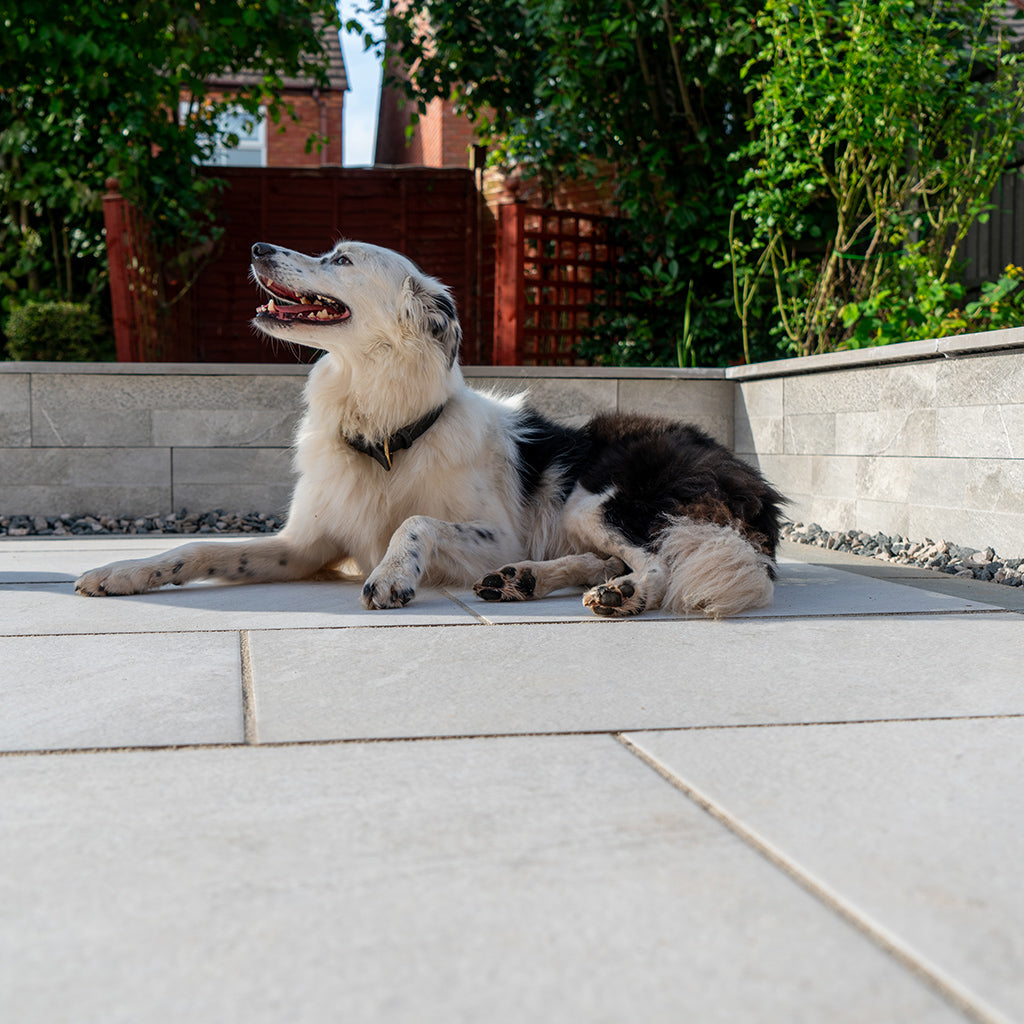0115 684 8754

What paving material is right for your patio?
If you’re planning a garden renovation then you’re in the right place! This blog will explain the differences between the paving materials: Concrete, Natural Stone and Porcelain — comparing durability, maintenance, finish and cost.
By the end of this article, you should be able to decide which is most suitable for you! But if you're short on time, just take a quick glance at our handy table:
Handy quick glance table
|
Paving material |
Description |
Durability* |
Weather safe* |
Maintenance* |
Luxury finish* |
Cost* |
|
Concrete |
Man-made, porous |
High |
Low |
High |
Moderate |
Moderate |
|
Natural Stone** |
Natural, porous |
High |
Moderate |
High |
High |
High |
|
Porcelain |
Man-made, non-porous, non-slip |
High |
High |
Low |
High |
High |
*Note: Durability, Weather Safety, Maintenance, Aesthetic Appeal, and Cost may vary based on factors such as product and installation quality, climate, and usage patterns.
**Note: There is a large variety of natural stones to choose from, so this is a general overview, but it’s important to note that some natural stones will require more maintenance, or be more durable and weather safe than others.

Durability
In general, all of these materials are durable if they’ve been laid properly! If you need help laying your pavement we have connections with Select approved installers.
How durable is concrete?
Concrete is pretty durable. It is a man-made material, and has been designed to withstand high amounts of weight.
However, these slabs might not be suited to a British climate as they can get slippery, making them dangerous in areas that get a lot of rain and/or fog.
How durable is natural stone?
Natural stone is highly durable — it takes thousands of years to form and has been around long before it becomes part of your garden! It is known to withstand high amounts of weight and is known for its hard-wearing properties.
Natural stone is also more suited to the British climate than concrete, and should stand the test of time — even in harsh weather conditions. However, some natural stones can get slippery so care needs to be taken on rainy days.
Because there is a variety of natural stone types to choose from, if you want to go down the natural stone route for your garden, it would be worth researching even further into the type of stone you would like, as some natural stones are more durable and safer than others.
How durable is porcelain?
Porcelain is highly durable. It is a man-made material made from a mixture of clay, sand and other minerals. It is also known for its hard-wearing properties and can handle the weight of vehicles if required.
But what makes this material unique is that it is non-porous and non-slip. It is safe all year round, no matter the weather. Making it perfect for the British rainy climate, and even on those summer days the paving will not get too hot underfoot in the sun. This means it is all-round less susceptible to damage.

Maintenance
Is concrete high maintenance?
Unfortunately, concrete paving is more high maintenance than natural stone and porcelain. As concrete ages, it becomes more brittle resulting in cracks which allow weeds to grow through them.
These cracks are difficult to fix so concrete paving is not the best option if you’re looking for longevity.
Concrete tiles are also porous which means they are more prone to staining — you will need to take extra care if you want them to last.
Is natural stone high maintenance?
Natural stone paving is higher maintenance than porcelain, but less maintenance than concrete, this is because it will require occasional sealing to maintain its beauty.
Sealing your natural stone every 1-2 years will help prevent any staining, growth of moss and colour fading. As this is also a porous material, if you do get a stain on your natural stone you will require a specialist product to help remove it.
Is porcelain high maintenance?
Porcelain paving is low maintenance, in fact, you will hardly have to lift a finger! This is because of its non-porous nature — excess moisture won’t seep or build up in the slabs so it won’t be prone to staining.
If you do spot some dirt or spills, simply wipe them clean with a damp cloth (pretty easy, huh?)

Colour and finish
Concrete colour and finishes
Colour and finish is dependent on which concrete slab you buy, but one thing to note is that dyes used for colouring concrete slabs have a limited lifespan and are known to fade back to grey.
Natural stone colour and finishes
The beauty of natural stone lies in how the colours and patterns organically vary from piece to piece. This will add sophistication and character to your garden as no two pieces of slab will be the same.
There is a huge variety of natural stone to choose from, meaning it’s easy to find the perfect colour and texture for your project. Natural stones can also be treated to offer a range of textures and finishes too. The possibilities are endless!
Porcelain colour and finishes
Porcelain does a fantastic job at mimicking natural stone visually, however, to touch it is smooth. It doesn’t physically feature the harsh riven surfaces found in natural stone, this is because it is a high-quality printed imitation on a smooth surface.
It’s printed nature are a lot of benefits, as it will allow you to have more control over the finish of your outdoor space, as the colour and tone of each slab is consistent. It is also impervious to fading and will stay true to their original colour for years to come.
However, you will need to carefully plan ahead how you will lay each piece, unlike natural stone, you do get limited parent variations. To achieve a natural look with porcelain paving, simply make sure you don’t have two matching pieces next to each other.

Cost
Is concrete expensive?
In general, concrete is known for its affordability, however might not stand the test of time. It is a great option if you’re looking for something budget-friendly. There are, of course, premium concrete products that are even more expensive than natural stone.
Is natural stone expensive?
Natural stone paving is generally more expensive than concrete, but you also need to factor in the long-term costs as it will require upkeep to clean unsightly stains and to also seal every couple of years. That being said, it should last for many years!
Is porcelain expensive?
We believe Porcelain is the most affordable option, despite being seen as ‘top-of-the-range’ it has become more affordable over the years, plus no extra money on maintenance or sealing is a big win!
Porcelain paving will also save you time and money in the long run. It is thought to last up to 50 years.
Our Select Porcelain Paving comes with a 10 year warranty and we also have a budget-friendly option if cost is a concern for you. (Select porcelain paving comes with a 10 year warranty).

Is porcelain right for my patio?
Now we might be biassed, but there is a reason why we choose to sell porcelain over the other types of patio material, and that is because it offers the winning combination of being low maintenance (hello lazy garden days!) with a high-end finish. And when it comes down to it, in the long-term, we believe it’s also the most affordable.
You can read more about the pros and cons of porcelain, but if you feel like you’re ready for the next step here is a glance at our own fantastic range of Porcelain tiles:
|
Product |
Image |
Size (mm) |
Aesthetic it mimics |
Color Options |
Range |
 |
600x900 |
“Stone-effect” |
Beige, Light Grey, Dark Grey |
Budget Friendly |
|
 |
600x900 |
“Natural Sandstone” “Stone-effect” |
Beige, Light Grey, Dark Grey |
Budget Friendly |
|
 |
600x600, 600x900, Project Pack |
“Natural Sandstone” |
Grey |
Budget Friendly |
|
 |
600x600 |
“Concrete Finish” |
Beige, Light Grey, Dark Grey |
Budget Friendly |
|
 |
600x900 |
“Stone-effect” |
Beige, Light Grey, Taupe |
Luxury Italian |
|
 |
610x1220 |
Beige, Light Grey, Dark Grey |
Luxury Italian |
||
 |
500 x 1000 |
“Slate” |
Beige, Light Grey, White |
Luxury Italian |


